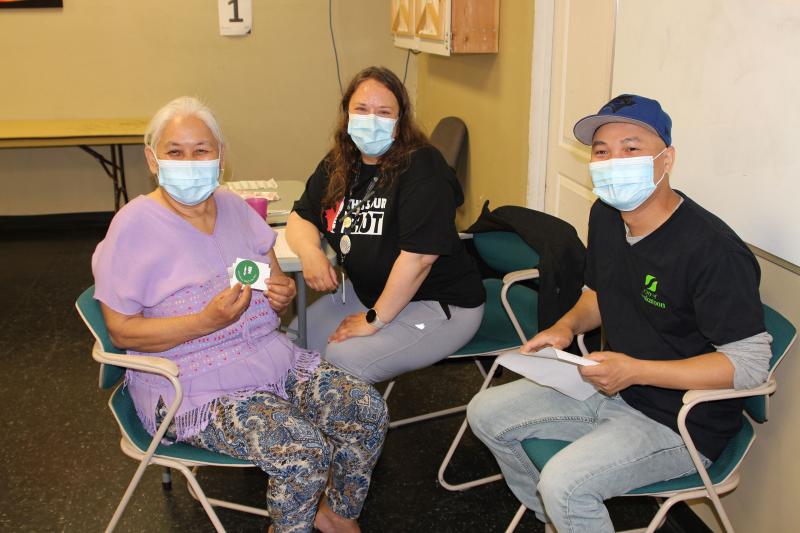Strong partnerships deliver vaccine through clinic in community
A number of partners recently helped 109 individuals receive immunizations at a targeted mobile clinic in Saskatoon.
The Saskatchewan Health Authority (SHA), City of Saskatoon (CoS) and community members held a vaccine clinic in Meadowgreen, a neighbourhood home to many individuals with lived refugee/immigrant experience from various ethnic backgrounds – groups for whom vaccine access can be a challenge.
“Working with these partners was instrumental to the clinic’s success,” said Tara Anderson, Patient and Family Centered Care Specialist working as a part of Saskatoon’s engagement team. “Everyone brought their unique skills, abilities and connections, and we needed all of those pieces.”
The SHA originally reached out to the CoS, which has a strong ethno-cultural network, to begin to address some known barriers and challenges to vaccine access, and that led to connecting with Bwe Dohsoe and Senos Timon.
“We all have to look after each other,” said Dohsoe, who volunteers extensively as part of the Karen community. “We come together based on the needs of the community. As refugees, it can be hard to navigate the systems and to know where to start.”
That sentiment was echoed by Timon, President of the Equatorian South Sudanese Community Association in Saskatoon.
“COVID made it impossible for us to come together and support each other in the way we usually do,” said Timon. “When the opportunity came to do this mobile vaccine clinic, we thought it was a very good thing. We were able to reach out, so members of our community who struggle with language or don’t drive, or who wouldn’t have taken the initiative to get the vaccine at a bigger clinic, got their vaccine.”
Having Timon, Dohsoe and other volunteers on site ensured a level of familiarity for the people from their communities who were coming to be vaccinated. The community members offered supports and answered questions as people came to the clinic.
“We know how important it is to get the vaccine and, at the same time, how scary it is for our elders,” said Dohsoe. “They got to spend more time with the nurses, and the nurses were so patient. People were very happy, and having the interpreters and the community there made a huge difference.”
April Sora, Immigration, Diversity and Inclusion Consultant at the CoS, also emphasized the importance of the partnership between the SHA, the community and the city.
“Everything aligned and all the right people were in place,” said Sora. “Setting up this clinic and working with the health authority was one of the smoothest projects I’ve ever worked on. Every single person along the way understood what we were doing and why we were doing it, and everybody really wanted to meet our objective – to get everybody vaccinated.
“Senos and Bwe are the only two people in the city who could have made this happen,” she added. “They know the population. We don’t. And so together, we set ourselves up for success. The clinic was a model for how we can work collaboratively with community, for community.”
The clinic was held in Meadowgreen, at the House for All Nations, which is well known in the community, and normally offers free lunches, community programming, drop-ins and church services.
“The process was so simple and there wasn’t a lot of paperwork,” said Timon. “The staff were so helpful and engaging – it was a very positive experience for those who got a vaccine.”



